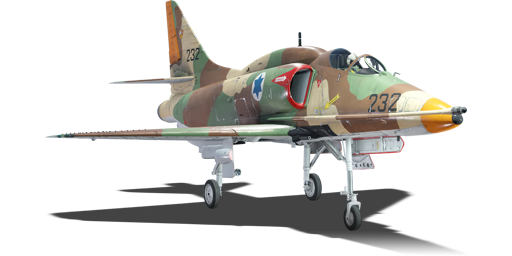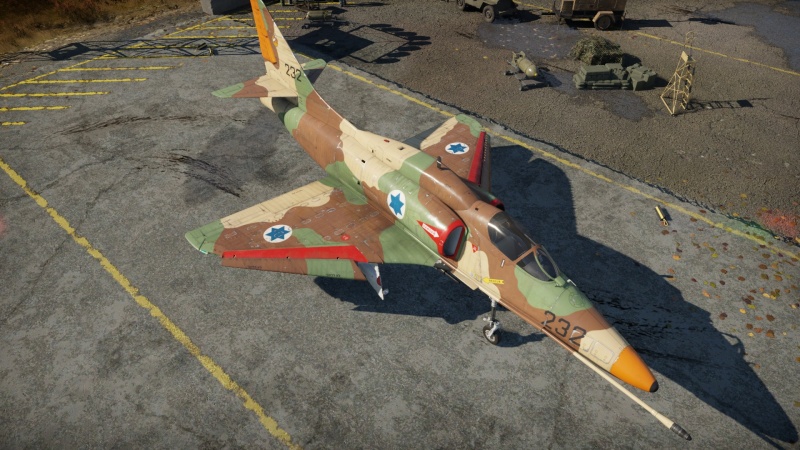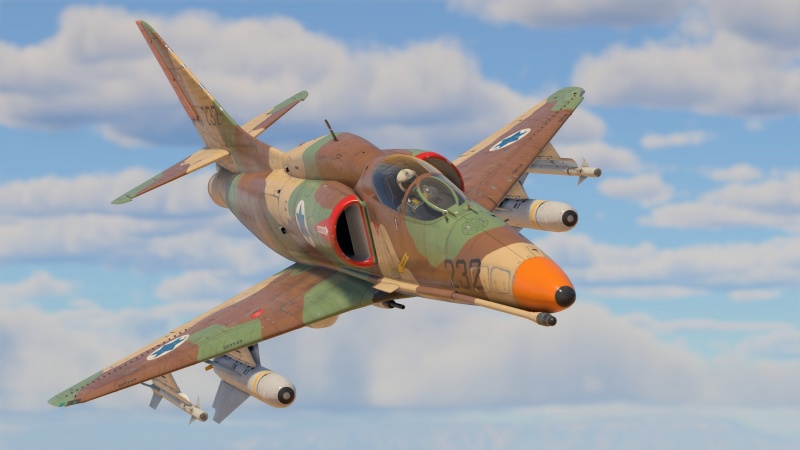Difference between revisions of "A-4E (Israel)"
Stagnantlamp (talk | contribs) (→Pros and cons: It is my understanding that the plane has undergone major changes to both the power-plant and flight model since this piece was written. I have made changes that reflect my experience with the plane since these changes.) (Tag: Visual edit) |
Stagnantlamp (talk | contribs) (Changes made to reflect my previous changes to the 'Pros and Cons' section.) (Tag: Visual edit) |
||
| Line 18: | Line 18: | ||
{{Specs-Avia-Flight}} | {{Specs-Avia-Flight}} | ||
<!-- ''Describe how the aircraft behaves in the air. Speed, manoeuvrability, acceleration and allowable loads - these are the most important characteristics of the vehicle.'' --> | <!-- ''Describe how the aircraft behaves in the air. Speed, manoeuvrability, acceleration and allowable loads - these are the most important characteristics of the vehicle.'' --> | ||
| − | The A-4E has a really decent speed for its BR but loses a great amount of energy at every turn. It | + | The A-4E has a really decent speed for its BR but loses a great amount of energy at every turn. It accelerates modestly well and is able to reach up to Mach 1.14 in a dive without breaking the wings. Flaps are automatically deployed, so if you set the flaps to landing, it won't deploy them until is safe to do so. This only works if the flaps are not already deployed, if so, it won't retract flaps and you will break them if over speeds of 400+ km/h. The aircraft is capable of maintaining 8 Gs in a turn, but it will overload if a higher turn is made. It is very easy to break the wings pulling hard turns, either negative or positive Gs. With a full load of fuel and a heavy bomb loadout wings become way weaker: any slight turn in negative Gs will overload and break the wings. |
{| class="wikitable" style="text-align:center" width="70%" | {| class="wikitable" style="text-align:center" width="70%" | ||
Revision as of 01:16, 8 May 2022
| This page is about the strike aircraft A-4E (Israel). For other versions, see A-4 (Family). |
Contents
Description
The A-4E Skyhawk is a premium gift rank VI Israeli strike aircraft with a battle rating of 9.0 (AB), 8.7 (RB), and 9.3 (SB). It was introduced as a premium pack in Update "Ground Breaking".
General info
Flight performance
The A-4E has a really decent speed for its BR but loses a great amount of energy at every turn. It accelerates modestly well and is able to reach up to Mach 1.14 in a dive without breaking the wings. Flaps are automatically deployed, so if you set the flaps to landing, it won't deploy them until is safe to do so. This only works if the flaps are not already deployed, if so, it won't retract flaps and you will break them if over speeds of 400+ km/h. The aircraft is capable of maintaining 8 Gs in a turn, but it will overload if a higher turn is made. It is very easy to break the wings pulling hard turns, either negative or positive Gs. With a full load of fuel and a heavy bomb loadout wings become way weaker: any slight turn in negative Gs will overload and break the wings.
| Characteristics | Max Speed (km/h at 0 m - sea level) |
Max altitude (metres) |
Turn time (seconds) |
Rate of climb (metres/second) |
Take-off run (metres) | |||
|---|---|---|---|---|---|---|---|---|
| AB | RB | AB | RB | AB | RB | |||
| Stock | ___ | ___ | 12500 | __._ | __._ | __._ | __._ | 900 |
| Upgraded | 1,095 | 1,081 | 36.3 | 37.0 | 53.0 | 39.7 | ||
Details
| Features | |||||
|---|---|---|---|---|---|
| Combat flaps | Take-off flaps | Landing flaps | Air brakes | Arrestor gear | Drogue chute |
| ✓ | ✓ | ✓ | ✓ | ✓ | ✓ |
| Limits | ||||||
|---|---|---|---|---|---|---|
| Wings (km/h) | Gear (km/h) | Flaps (km/h) | Max Static G | |||
| Combat | Take-off | Landing | + | - | ||
| 0 | 437 | 592 | 562 | 410 | ~8 | ~3 |
| Optimal velocities (km/h) | |||
|---|---|---|---|
| Ailerons | Rudder | Elevators | Radiator |
| < 450 | < 700 | < 490 | N/A |
Engine performance
| Engine | Aircraft mass | ||||||
|---|---|---|---|---|---|---|---|
| Engine name | Number | Basic mass | Wing loading (full fuel) | ||||
| Pratt & Whitney J52-P-8A | 1 | 5,049 kg | 311 kg/m2 | ||||
| Engine characteristics | Mass with fuel (no weapons load) | Max Takeoff Weight | |||||
| Weight (each) | Type | 11m fuel | 20m fuel | 30m fuel | 39m fuel | ||
| 950 kg | Axial-flow turbojet | 5,789 kg | 6,292 kg | 6,913 kg | 7,517 kg | 11,113 kg | |
| Maximum engine thrust @ 0 m (RB/SB) | Thrust to weight ratio @ 0 m (100%) | ||||||
| Condition | 100% | WEP | 11m fuel | 20m fuel | 30m fuel | 39m fuel | MTOW |
| Stationary | 3,754 kgf | N/A | 0.65 | 0.60 | 0.54 | 0.50 | 0.34 |
| Optimal | 3,754 kgf (0 km/h) |
N/A | 0.65 | 0.60 | 0.54 | 0.50 | 0.34 |
Survivability and armour
Examine the survivability of the aircraft. Note how vulnerable the structure is and how secure the pilot is, whether the fuel tanks are armoured, etc. Describe the armour, if there is any, and also mention the vulnerability of other critical aircraft systems.
Modifications and economy
Armaments
| Ballistic Computer | |||
|---|---|---|---|
| CCIP (Guns) | CCIP (Rockets) | CCIP (Bombs) | CCRP (Bombs) |
| |
|
|
|
Offensive armament
The A-4E (Israel) is armed with:
- A choice between two presets:
- 2 x 30 mm DEFA 553 cannons, belly-mounted (150 rpg = 300 total)
- 2 x 30 mm DEFA 553 cannons + 60 x countermeasures
Suspended armament
The A-4E (Israel) can be outfitted with the following ordnance:
- Without load
- 3 x 20 mm Mk 11 mod 5 cannons (750 rpg = 2,250 total)
- 20 x 250 lb LDGP Mk 81 bombs (5,000 lb total)
- 14 x 500 lb LDGP Mk 82 bombs (7,000 lb total)
- 3 x 750 lb M117 cone 45 bombs (2,250 lb total)
- 1 x 750 lb M117 cone 45 bomb + 114 x FFAR Mighty Mouse rockets (750 lb total)
- 1 x 750 lb M117 cone 45 bomb + 24 x Zuni Mk32 Mod 0 ATAP rockets (750 lb total)
- 3 x 750 lb M117 cone 45 bombs + 2 x AIM-9B Sidewinder missiles (2,250 lb total)
- 5 x 1,000 lb LDGP Mk 83 bombs (5,000 lb total)
- 1 x 2,000 lb LDGP Mk 84 bomb (2,000 lb total)
- 171 x FFAR Mighty Mouse rockets
- 36 x Zuni Mk32 Mod 0 ATAP rockets
- 2 x AIM-9B Sidewinder missiles
- 114 x FFAR Mighty Mouse rockets + 6 x 250 lb LDGP Mk 81 bombs (1,500 lb total)
- 114 x FFAR Mighty Mouse rockets + 6 x 500 lb LDGP Mk 82 bombs (3,000 lb total)
- 24 x Zuni Mk32 Mod 0 ATAP rockets + 6 x 250 lb LDGP Mk 81 bombs (1,500 lb total)
- 24 x Zuni Mk32 Mod 0 ATAP rockets + 6 x 500 lb LDGP Mk 82 bombs (3,000 lb total)
- 2 x AIM-9B Sidewinder missiles + 18 x 250 lb LDGP Mk 81 bombs (4,500 lb total)
- 2 x AIM-9B Sidewinder missiles + 12 x 500 lb LDGP Mk 82 bombs (6,000 lb total)
- 2 x AIM-9B Sidewinder missiles + 3 x 1,000 lb LDGP Mk 83 bombs (3,000 lb total)
- 2 x AIM-9B Sidewinder missiles + 1 x 2,000 lb LDGP Mk 84 bomb (2,000 lb total)
- 2 x AIM-9B Sidewinder missiles + 133 x FFAR Mighty Mouse rockets
- 2 x AIM-9B Sidewinder missiles + 28 x Zuni Mk32 Mod 0 ATAP rockets
- 2 x AIM-9B Sidewinder missiles + 1 x 20 mm Mk 11 mod 5 cannon (750 rpg)
- 2 x 510 kg AGM-62A Walleye I ER bombs (1,020 kg total)
- 2 x 510 kg AGM-62A Walleye I ER bombs + 6 x 250 lb LDGP Mk 81 bombs (3,749 lb total)
- 2 x 510 kg AGM-62A Walleye I ER bombs + 6 x 500 lb LDGP Mk 82 bombs (5,249 lb total)
- 2 x 510 kg AGM-62A Walleye I ER bombs + 1 x 750 lb M117 cone 45 bomb (2,999 lb total)
- 2 x 510 kg AGM-62A Walleye I ER bombs + 3 x 1,000 lb LDGP Mk 83 bombs (5,249 lb total)
- 2 x 510 kg AGM-62A Walleye I ER bombs + 2 x AIM-9B Sidewinder missiles + 6 x 250 lb LDGP Mk 81 bombs (3,749 lb total)
- 2 x 510 kg AGM-62A Walleye I ER bombs + 2 x AIM-9B Sidewinder missiles + 6 x 500 lb LDGP Mk 82 bombs (5,249 lb total)
- 2 x 510 kg AGM-62A Walleye I ER bombs + 2 x AIM-9B Sidewinder missiles + 1 x 750 lb M117 cone 45 bomb (2,999 lb total)
- 2 x 510 kg AGM-62A Walleye I ER bombs + 2 x AIM-9B Sidewinder missiles + 3 x 1,000 lb LDGP Mk 83 bombs (5,249 lb total)
- 2 x 510 kg AGM-62A Walleye I ER bombs + 2 x AIM-9B Sidewinder missiles (1,020 kg total)
- 1 x 2,000 lb GBU-8 bomb (2,000 lb total)
- 1 x 2,000 lb GBU-8 bomb + 2 x AIM-9B Sidewinder missiles (2,000 lb total)
The largest payload is the 14 x 500 lb bombs which if all dropped on one base will net 1.34 tons of TNT equivalent.
Usage in battles
- Simulator battles
Ground attack - With its large payload options and capability, the A-4E is very capable at ground attack or base bombing. The AGM-62A Walleye bombs have a tremendous advantage of stand-off bombing, while you only get roughly 2,000 lbs of explosives in the loadout, dropping from high altitudes (24+ km / 8,000+ ft) at a speed nearing Mach 0.8 can have the AGM-62A with some practice traveling beyond 8 km (5 mi) to a target. The 30 mm DEFA cannons are phenomenal in accuracy, ammo count, and stopping power. However, with the plane being nose heavy, your angle of attack is extremely high at low speeds, which can lead to slam into the ground when trying to strafe ground targets with guns.
Air combat - In a dogfight, the A-4E can hold its own if kept above 800 km/h IAS (500 mph). If you drop below this air speed, your angle of attack increases dramatically since the plane is nose heavy. Combined with the rather weak engine, this creates a situation of high drag low thrust, meaning you will not be able to recover your air speed during the engagement. The A-4E's wings will start to lose lift in a high G pull around 480 km/h IAS (300 mph). Therefore, your best bet is to avoid turnfighting at all costs.
This plane is an attacker and excels at it, with its ordnance. But only in extreme measures could the A-4E be flown as a fighter.
Trim-wise the A-4E is all over the place: it does not like to settle. You will find yourself from a 25-30% elevator trim at 400 km/h IAS (250 mph ) to a 5% trim at 800 km/h IAS (500 mph). At roughly 840-880 km/h IAS (525-550 mph), the plane becomes stable (meaning +1% or -1% trim). This can make newer pilots to the plane feel like they are overworking in this plane as it requires a very attentive pilot.
The goal in this plane is to attack ground and keep the 15-minute timer constantly going. You can do this by taking 2 Walleyes with you and destroying 2 tanks or pillboxes. You can also do this by loading 7,000 lbs of bombs and bombing a base, or by strapping on 171 mighty mouse rockets and strafing a ship. All these methods will net the same profit as in SB, more money is earned from passive income than from useful actions.
Pros and cons
Pros:
- Payload is extremely high and well balanced allowing you to tailor your gameplay and loadout to the situation at hand.
- AGM-62A guide bomb allows a knowledgeable pilot to strike a target while miles away.
- Flares and Chaff along with RWR can increase your survivability.
- 30 mm DEFA have high accuracy, stopping power, and ammo count.
- Carrying 2 x AIM-9B air-to-air allows for some offensive behaviour.
- The plane carries enough payload to take out a full base or convoy in a single pass.
- Good Roll Rate
- Fair Acceleration (Especially good at low speeds).
- Very low stall speed.
- A Resilient and Tough plane.
Cons:
- In SB, the seating position is very low. without manual adjustment it will feel like you are sitting in a bath tub.
- In SB, the rear visibility is not great.
- In SB, A pilot will have to constantly be at the controls due to the wild changes in pitch and lift the plane experiences.
- Turning requires a high angle of attack which bleeds airspeed extremely quickly.
- The Plane performs worse in a sustained Rate Fight compared to it's main adversaries.
- The Plane has a tendency to rip it's wings if forced to withstand 10 or more G's for extended periods of time.
History
Israel had been interested in purchasing American combat planes ever since its inception in 1948, but rocky relations with the US resulted in the Americans refusing the vast majority of proposals over several decades. 1965 saw the first approval of a major deal for American combat jets, in which Israel would (initially) receive 48 A-4H Skyhawks. Due to lingering American reluctance to sell high-end military equipment to Israel at the time, the A-4H was actually a stripped-down variant of the A-4F (itself an improvement of the A-4E), removing several key abilities from the aircraft: It had no ability to fire AAMs, had a downgraded bombing sight, and could only carry a limited variety of air-to-ground weaponry.
The Israeli Air Force named the aircraft Ayit (Eagle), and very quickly restored all of its missing functionalities - while also adding several new features that had never been present in any of the American models. It regained the ability to fire AAMs, and was now capable of firing heat-seeking AAMs - previously unavailable to any A-4 model. Israel also installed improved avionics, a French DEFA 30 mm twin autocannon (to replace the American Colt 20 mm), equipment for the launching of precision-guided munitions, and an extended jet pipe that decreased the aircraft's vulnerability to heat-seeking SAMs.
The A-4H Skyhawks quickly replaced the Dassault Mystère to become Israel's primary ground-attack aircraft during the late 1960s. Skyhawks participated heavily in the War of Attrition (1968-1970). One Ayit even managed to shoot down a Syrian MiG-17 using unguided rockets.
The impressive performance of the A-4H eventually led Israel to purchase a large number of them, including several dozen "classic" A-4Es that had previously served in the US Navy. These A-4Es quickly received upgrades to match the A-4Hs in performance. In total, Israel purchased over 250 Skyhawks, becoming the world's leading importer of the aircraft. A-4H Skyhawks continued on to serve in the 1973 Yom Kippur War, the 1982 Lebanon War, and in many later Israeli operations. During the 1970s they were gradually replaced by the F-4 Phantom II and later the F-16. While most of the A-4H Skyhawks were eventually sold to Indonesia, many others remained in service as training aircraft until 2015.
Media
Excellent additions to the article would be video guides, screenshots from the game, and photos.
See also
Links to the articles on the War Thunder Wiki that you think will be useful for the reader, for example:
- reference to the series of the aircraft;
- links to approximate analogues of other nations and research trees.
External links
| Douglas Aircraft Company | |
|---|---|
| Strike Aircraft | A-20G-25 · A-26B-10 · A-26B-50 · AD-2 · AD-4 · A-1H |
| Bombers | TBD-1 · B-18A · SBD-3 · BTD-1 · A-26C-45 · A-26C-45DT |
| Turboprops | A2D-1 |
| Jet Aircraft | F3D-1 · F4D-1 |
| A-4 Skyhawk | A-4B · A-4E Early |
| Export | ▄Havoc Mk I · ▄Boston Mk I · ▄DB-7 · ▂A-20G-30 · ▄AD-4 · ▄AD-4NA |
| A-4 Skyhawk | A-4H · A-4E Early (M) · Ayit · A-4E |
| The Douglas Aircraft Company merged with McDonnell Aircraft Corporation in 1967 to form McDonnell Douglas. | |
| Israel jet aircraft | |
|---|---|
| Kfir Canard · Kfir C.2 · Kfir C.7 · Nesher | |
| Britain | |
| Meteor | Meteor NF.13 · Meteor F.8 |
| France | |
| Vautour | Vautour IIA · Vautour IIN |
| Super Mystere | Sambad · Sa'ar |
| Mirage III | Shahak |
| Other | M.D.450B Ouragan · Mystere IVA |
| USA | |
| F-84 | F-84F |
| A-4 | A-4H · A-4E Early (M) · A-4E · Ayit |
| F-4 | Kurnass · Kurnass 2000 |
| F-15 | Baz · Baz Meshupar · F-15I Ra’am |
| F-16 | Netz · F-16C Barak II · F-16D Barak II |
| Israel premium aircraft | |
|---|---|






